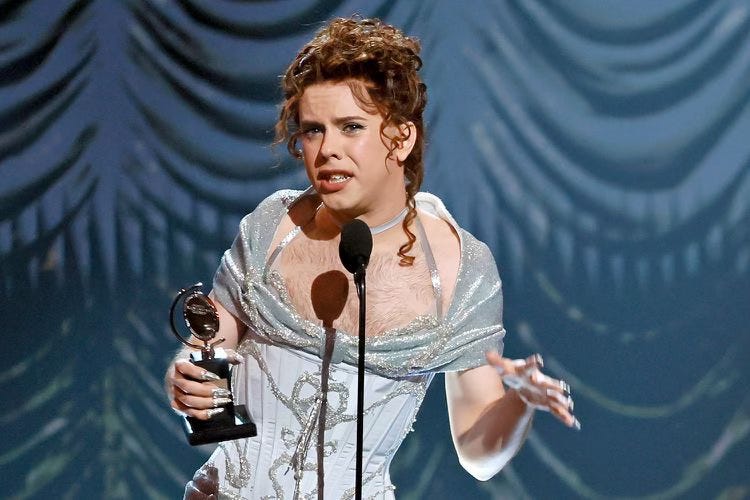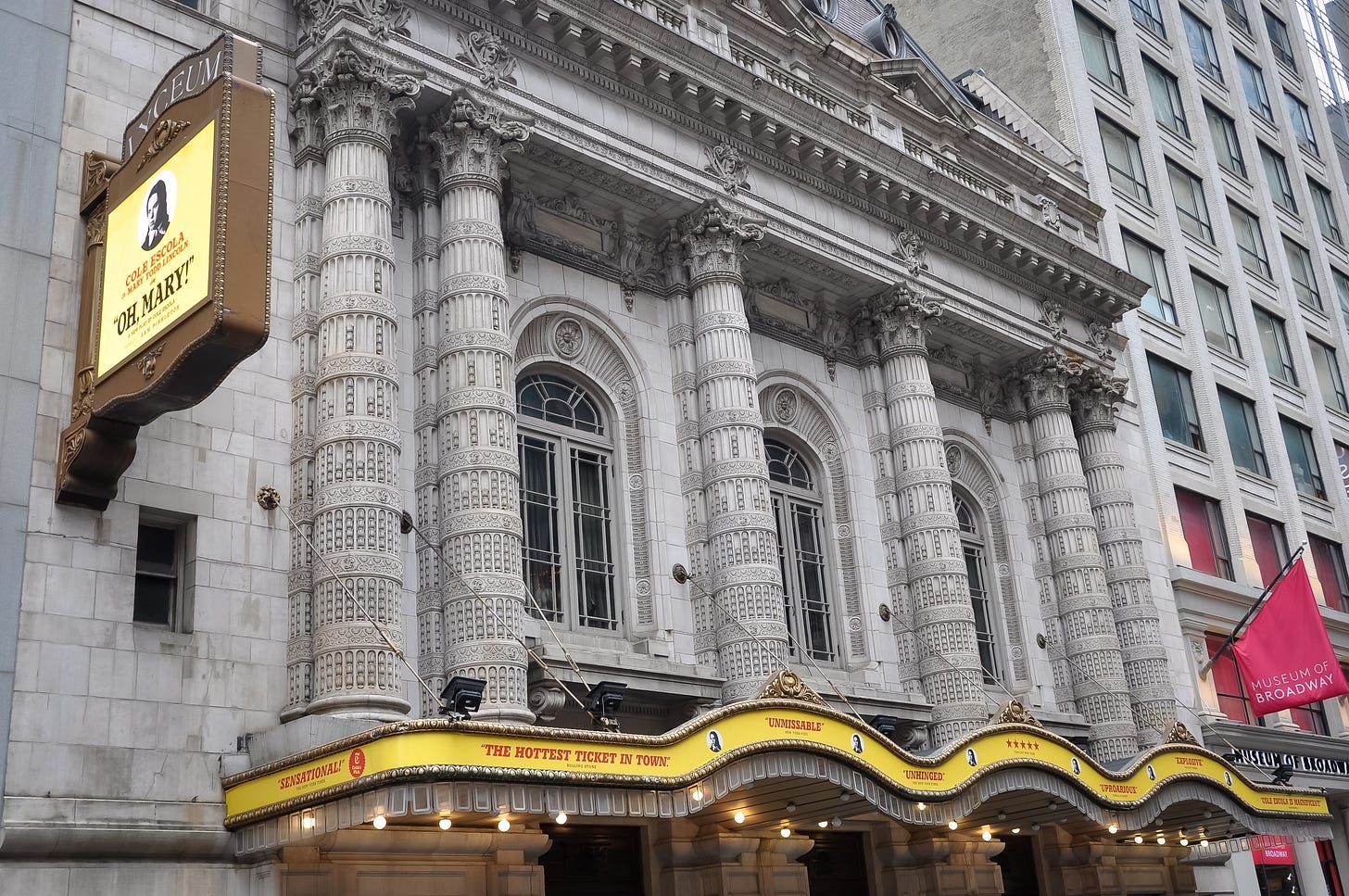Self-Sabotage - Jeffrey Self
How Jeffrey Self’s messy memoir led me to Cole Escola’s brilliant mayhem
I didn’t even pick up Self-Sabotage on purpose. It landed in my lap through Eric Cervini’s Very Gay Book Club, which I’d joined on a whim. The club promised monthly selections from across queer history and culture. When I signed up, I made a vow: I would read every book, no matter what. Even if it wasn’t something I would normally gravitate toward.
That’s how I ended up with Jeffrey Self’s memoir.
A book I didn’t know I needed
Self-Sabotage is exactly what its title suggests—funny, chaotic, painfully self-deprecating. Self has a way of turning disaster into camp, humiliation into punchline. His stories about career pratfalls and dating mishaps carry the wink of someone who knows that laughing at yourself is sometimes the only way forward.
I enjoyed it. It wasn’t trying to be a grand statement on queer life, and that was part of the charm. It felt like listening to a witty friend overshare at brunch. There were moments I laughed out loud, others I winced in recognition, and still others where I thought: “only a gay man could describe humiliation this vividly and make it feel glamorous.”
But what lingered with me most wasn’t any one anecdote. It was a name tucked into the pages: Cole Escola.
The breadcrumb
At first, it barely registered. Just another reference, a passing nod in a book full of them. But queer culture often spreads that way—not through official channels or assigned reading lists, but through whispers, cameos, side mentions. One name tips you toward another. A late-night clip leads to an obsession. A book you might never have picked up leaves behind a breadcrumb, and if you follow it, you find yourself somewhere you never expected.
For me, that breadcrumb led to Cole Escola.
I went digging—clips on YouTube, sketches from their cult series Jeffery & Cole Casserole, oddball performances tucked away online. The first impression was chaos. Escola was grotesque, campy, deliberately off-kilter. But there was something magnetic about it, too. Beneath the shrieking absurdity was control, a sense that they knew exactly what they were doing even as they seemed to unravel.
Then I found their appearances on At Home with Amy Sedaris. Watching Escola spar with Sedaris was like watching a generational handoff. Sedaris, with her Strangers with Candy pedigree, is practically queer comedy royalty—part saint, part saboteur. Seeing her fold Escola into her world felt like witnessing a lineage in real time. The DNA was obvious: anarchic, grotesque, self-aware, and deeply funny.
From downtown to Sunday morning
And then came the moment when I realized this wasn’t just my private rabbit hole. One Sunday morning in May 2025, I flipped on CBS. There was Mo Rocca, introducing Cole Escola to America on CBS Sunday Morning.
I grew up watching Rocca on The Daily Show, back when I didn’t even know he was gay. He was just another sharp, witty correspondent in Jon Stewart’s orbit. To see him years later—openly gay, thoughtful, still funny—sitting across from Cole Escola on Sunday Morning was unexpectedly moving. Here was a journalist I respected, someone who had been in my living room for years, now giving serious attention to a queer artist on one of television’s most venerable institutions.
If you saw the segment, you’ll remember the moment: Rocca, with that mix of mischief and earnestness, asked Escola what it meant to be called a “demon twink.” Escola, deadpan and sly, volleyed it right back—embracing the chaos of the label while making it feel like an artistic mission statement. Watching that exchange was surreal. A performer I’d first glimpsed as a name in Jeffrey Self’s memoir was now beamed into living rooms after church, dubbed a demon twink on national television.
I would never have imagined such a thing on Sunday Morning back when it was all stained glass and small-town Americana. The show used to be built on comfort—covered bridges, antique shops, polite piano riffs. The idea of a gay correspondent seemed far-fetched, let alone a segment where “demon twink” rolled out naturally in the middle of a conversation. And yet here it was: Mo Rocca and Cole Escola, broadcast not as niche comedy but as Sunday ritual, right after church.
(Read the Story here): CBS Sunday Morning interview with Cole Escola)
That was the moment I realized Escola wasn’t just a breadcrumb on my personal journey. They were about to break open into the broader culture.
The trip
By then, I was all in. My partner and I planned a quick trip to New York in June 2025—three days, the kind of trip where you overpack a weekend with too many restaurants and too many museums. But the real reason we picked those dates had nothing to do with MoMA or bagels. It was Oh, Mary!
And for once, I felt like I’d beaten the clock. I managed to buy tickets before the Tony win on June 8, before the show tipped from buzzy to impossible. For the first time in my life, I felt like I was in on something early—so early that I even knew about Cole before my kids did, and certainly before my parents saw them smiling on Sunday Morning.
We saw it near the end of Escola’s run, just after they had won the Tony. There’s something electric about catching an artist in that exact moment—still raw enough to feel dangerous, but suddenly validated by the establishment.
The theater buzzed with anticipation. The group behind us was seeing the play for their 3rd or 4th time. The air felt charged, as if everyone there knew they were about to see something that would be talked about for years. And then the chaos began.
Honest Abe, queered
Maybe it hit me harder because of my own history. I was born on Lincoln’s birthday, and as a kid I was forever told to “be like Honest Abe.” So there I was, decades later, sitting in a Broadway theater watching Cole Escola turn Mary Todd Lincoln into a shrieking, drunken chaos demon—and their version of Lincoln, too, coded as into men. The whole thing felt like a delicious, absurd collision between the myth I’d grown up with and the queer art I’d found as an adult.
Mary Todd Lincoln, unhinged
It’s hard to describe Oh, Mary! if you haven’t seen it. Escola’s Mary Todd staggers across the stage, flailing, collapsing, resurrecting, dragging American history through queer camp until it collapses under the weight of its own absurdity. One minute they’re shrieking in hoop skirts, the next they’re in grotesque melodrama, then pivoting into a one-liner so sharp it makes the whole room howl.
It was grotesque. It was hilarious. It was deeply moving, in a way that’s hard to articulate. The show didn’t “reinterpret” history—it demolished it, then rebuilt it as something truer in its ridiculousness than any straight textbook could provide.
The audience roared. The energy in the room was unlike anything I’d felt in a theater. We weren’t just watching a play. We were watching a moment.
Walking back to the hotel that night, sticky from the June heat, I thought about how unlikely it was that I’d ended up there. A book club vow. A messy but funny memoir. A breadcrumb in the form of a name. And suddenly, I was in a Broadway theater watching Cole Escola torch American history and win a Tony for it.
The constellation
That’s how queer art often works. It doesn’t move in straight lines. We don’t find each other through official channels or carefully curated syllabi. We find each other through asides, cameos, references that only make sense if you follow them. Jeffrey Self points to Cole Escola. Escola links to Amy Sedaris. Mo Rocca beams the whole thing into mainstream America. A Big Gay Book Club pick leads to a night in a theater that feels both underground and historic.
It’s a constellation, not a roadmap.
And that’s why I’ll always remember Self-Sabotage fondly. Not because it was the most brilliant queer memoir I’ve read—it wasn’t trying to be—but because it did something just as important. It connected me to someone else. It left behind a breadcrumb that, once followed, turned into one of the best cultural experiences of my life.
Not every book has to change your life. Some just have to point you to someone who will.
That’s what Jeffrey Self did for me.
Stay Connected
Instagram • Facebook • Threads • Bookshop.org
📖 Subscribe to Caleb Reed for weekly chapters and essays.
📚 Buy Self-Sabotage by Jeffrey Self: Amazon
📚 Support independent bookstores: Bookshop.org
🎭 Cole Escola’s Oh, Mary! official site





Super fun read! I learned about so much new stuff. Thanks for this.